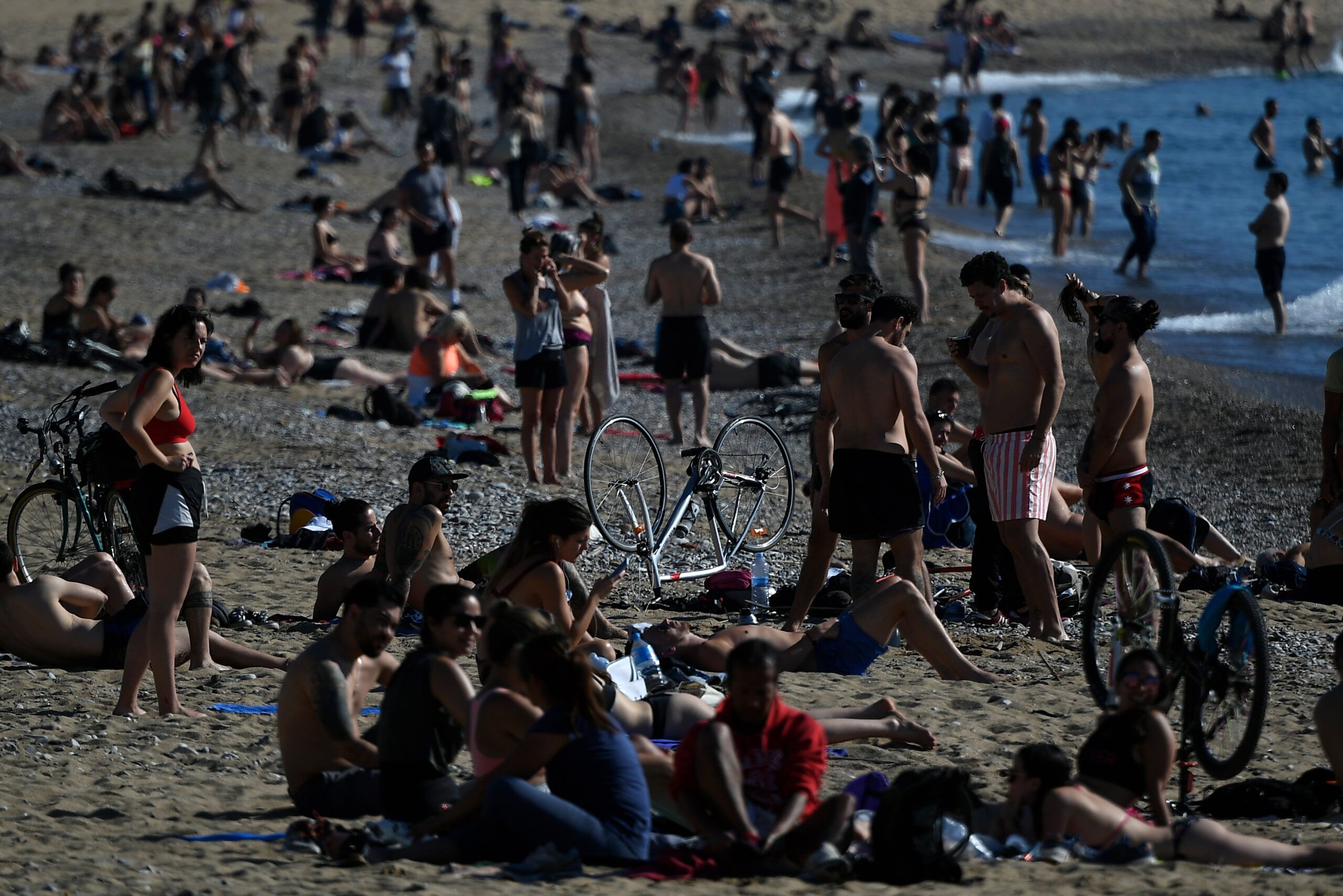Spain relaxes lockdown as South America named new epicentre
Foreign tourists will be allowed to return to Spain in July (LLUIS GENE)
Madrid (AFP) – Spain said Saturday it will let in foreign tourists and restart top league football in the coming weeks, accelerating Europe’s exit of strict virus lockdown, as South America is labelled “a new epicentre” by the World Health Organization.
Brazil led the surge across South America, its death toll passing 21,000 on Friday from 330,000 infections, the third highest caseload of any country in a pandemic that has infected 5.2 million globally and killed more than 338,000.
In Europe, rates of infections and deaths are stabilising in many countries, prompting governments to move away from economically ruinous lockdowns towards lighter social distancing measures.
President Donald Trump is leading a charge in the United States to have restrictions lifted — battling with the local and state officials who enforce the measures.
His latest demand on local officials was to reopen religious buildings for full services, saying: “In America, we need more prayer, not less.”
The US economy has shed almost 40 million jobs since the start of the pandemic and many companies have gone to the wall — car-rental giant Hertz the latest to hit trouble, filing for bankruptcy for its North American operations late on Friday.
– Overworked grave-diggers –
“In a sense, South America has become a new epicentre for the disease,” WHO emergencies director Mike Ryan said on Friday, singling out Brazil.
Unlike in Europe and the United States, where the elderly were hardest-hit, a significant number of deaths in Brazil have been younger people, who are often driven by poverty to work despite the threat of infection.
As the toll mounts, grave-diggers at a cemetery outside the commercial hub Sao Paulo are struggling to keep up.
“We’ve been working 12-hour days, burying them one after the other,” said one worker, wearing a white protective suit, mask and face shield.
Neighbouring Peru was also struggling with an intense outbreak — the country of 32 million registering more than 110,000 cases and 3,100 deaths.
The figures from South America, though disastrous, are dwarfed by the 96,000 deaths suffered so far in the United States, which has registered 1.6 million infections.
There are signs that India could be facing a greater outbreak than so far acknowledged, registering jumps of more than 5,000 cases each day for much of the past week — although from a much lower base than the hardest-hit countries in Europe and the Americas.
On the other hand, China, where the virus was first identified late last year, passed a massive milestone on Saturday when it was able to report no new infections for the first time since it began publishing daily data in January.
– Tourism transforms –
Spain, which had enforced one of the world’s strictest lockdowns since mid-March, made another huge leap back to normality on Saturday by announcing the return of football and tourism.
“From the month of July, entry for foreign tourists into Spain will resume in secure conditions,” said Prime Minister Pedro Sanchez, adding that La Liga football could return on June 8.
Spain’s southern European counterpart Italy was also trying to breathe life into its tourism industry.
A temple complex near the city of Naples, known as Paestum, reopened earlier this week but now allows fewer visitors and supplies them with an app that alerts them if too many people are gathered in one spot.
“We must focus on another type of tourism, another relationship with visitors, more intense, more ‘one to one’,” said site director Gabriel Zuchtriegel, adding that it could become a model for post-lockdown travel.
Across the Middle East, officials were looking to re-energise their flagging tourism and cultural centres.
Iran said its museums and historical sites would reopen to the public on Sunday, with holy shrines following on Monday.
And Jerusalem’s Church of the Holy Sepulchre will reopen on Sunday, the Christian authorities there said, but with tight restrictions on visitors.
– ‘It’s like 20 years ago’ –
However, experts have warned that restrictions will persist in some form until a vaccine or treatment is developed.
Hopes that existing drugs could be repurposed to treat the COVID-19 disease were dealt a blow on Friday when a study of hydroxychloroquine, a treatment often touted by Trump, showed it gave no benefit to patients and increased their risk of death.
With no end in sight for the restrictions, sporadic anti-lockdown protests have been taking place across the world.
Thousands gathered in Madrid on Saturday to demand an end to the rules and call on PM Sanchez to quit, in a protest led by the far-right party Vox.
People were scrambling to get around the rules in the world’s most populous Muslim country, Indonesia, so they could reunite with their families for the Eid al-Fitr festival.
One man told AFP he had managed to get a fake certificate for his daughter to travel home from university in the capital, Jakarta, saying “we miss her so much”.
“We want to celebrate Eid al-Fitr together like in past years,” he said.
Elsewhere, many Europeans were finding solace in their new mode of life, reclaiming their cities and towns from the tourist hordes.
“All my childhood, I played in this park,” said Laia Torra, in Barcelona’s UNESCO-listed Park Guell, adding that it has been too crowded in recent years to bring her children.
“It’s wonderful, it’s like going back 20 years,” she said as her children played.
burs-jxb/cdw
Disclaimer: Validity of the above story is for 7 Days from original date of publishing. Source: AFP.


